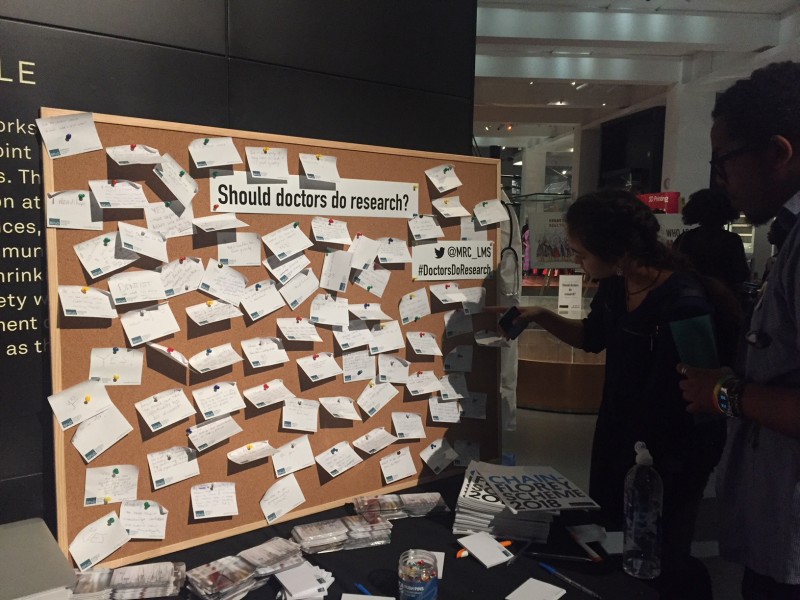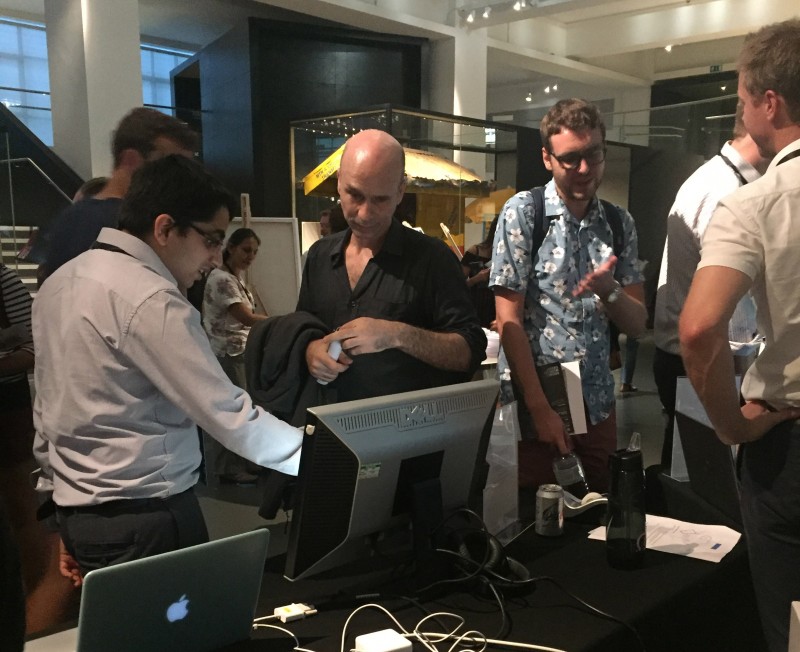By Sophie Arthur
August 3, 2018
Time to read: 5 minutes
The #NHS70 Medicine Lates took place on 25 July at the Science Museum, London.
Science Museum Lates is a series of adults-only, after-hours themed nights that take place on the last Wednesday of every month and feature interactive activities, hands-on stands, cutting-edge researchers, live music, museum tours and a silent disco.
July’s Medicine Lates was a particularly busy event with more than 3500 visitors, 52 events and 250 contributors. On the day, 15 researchers and staff members from the MRC LMS and Imperial Faculty of Medicine headed to the Science Museum to be part of the MRC LMS exhibit themed ‘Should doctors do research?’.
Our exhibit featured three key themes: ‘Should doctors do research?’, AI heart doctors and mental health imaging, and our Heroes of Health comic book.

Chain-Florey Lecturer Harry Leitch and Chain-Florey Clinical Research Fellow Hannah Beckwith headed this part of our exhibit and were on hand to discuss the question ‘Should doctors do research?’ with the Lates audience. From the conversations that took place and the thoughts posted on our opinion board (see left), it was evident that the majority of people believed it to be a good idea for doctors to do research, and that it is essential for medical science to progress. Nevertheless, it was noted that there are some important considerations that should be made, such as how much time doctors would sacrifice that would otherwise be spent treating patients.
Hannah Beckwith, Chain-Florey Clinical Research Fellow, MRC LMS, said “It was a great experience, I really enjoyed talking with such an engaged audience. The conversations were very diverse, covering a range of topics including research and funding priorities, personal interest versus benefit to society, the current NHS landscape and everything in between!”
In the run up to the event we hosted a Twitter poll asking our followers the same question, and the result was a resounding yes, with 89% of poll participants saying that doctors should do research.
At MRC LMS we believe doctors are uniquely placed to play a role in medical research. In 2009 we set up the Chain-Florey Clinical Research scheme in order to provide doctors with an opportunity to do so, yet, we understand that the question isn’t as straight forward as a simple yes or no answer.
AI heart doctors and mental health imaging
The second part of our exhibit showcased the cutting-edge medical research from the MR Facility, headed by Dr Declan O’Regan, and the Psychiatric Imaging research group, headed by Professor Oliver Howes.
The Magnetic Resonance (MR) Facility showcased how they are using AI to predict medical outcomes for patients with cardiovascular disease, Alaine Berry, Antonio de Marvao, Georgia Doumou, Jinming Duan, Marina Quinlan and Tim Dawes were there on the day to share images, algorithms and research and to question how technology is transforming the landscape of healthcare.
Tim Dawes, Academic Clinical Lecturer, National Heart and Lung Institute, Imperial College, shared his experience of Lates,
“A great opportunity to discuss new ideas with the people who might benefit from them. Challenging, thought provoking, and invigorating!”
 Abhishekh Ashok, Sameer Jauhar and Tom Whitehurst from the Psychiatric Imaging group discussed imaging techniques such as Positron Emission Tomography (PET) and functional magnetic resonance imaging (fMRI) and how these can be used to observe the brain’s response to anti-psychotic drugs, with the aim of understanding why some people react well and others don’t, in order to improve treatment for patients with psychosis.
Abhishekh Ashok, Sameer Jauhar and Tom Whitehurst from the Psychiatric Imaging group discussed imaging techniques such as Positron Emission Tomography (PET) and functional magnetic resonance imaging (fMRI) and how these can be used to observe the brain’s response to anti-psychotic drugs, with the aim of understanding why some people react well and others don’t, in order to improve treatment for patients with psychosis.
Dr Abhishekh Ashok, Visiting Research Worker, Psychiatric Imaging group, MRC LMS said,
“I thoroughly enjoyed the evening and getting to engage with the Lates audience and share our research into measuring brain chemicals and functions in patients with schizophrenia.”
Headed by Hamlata Dewchand and the GECo team: Jenna Stevens-Smith, Scout Davies and Ellie McLaughlin, our Heroes of Health comic book section highlighted the stories of eight pioneers of healthcare featured in the book and also showcased the work of the microscopy group, sharing contemporary microscopy images from our Biomedical Picture of the Day (BPoD) website.
Hamlata Dewchand, member of Laboratory Services, MRC LMS, enjoyed the Lates experience,
“It was fascinating to see the keen interest of the Lates audience and to hear their opinions and views on our research. We had great, engaging discussions about research happening at the MRC LMS and it was rewarding to see so many people getting excited about our microscopy images. In such a short space of time my passion was sparked and it reminded me of the curiosity that led me into science in the first place.”
Engaging with the public at Science Museum Lates gave us an insight into many different opinions and perspectives on both our research and our question ‘Should doctors do research?’, and was a unique opportunity to interact with an enthusiastic audience that was encouraging for researchers and staff alike.
If you work or study at MRC LMS and are interested in participating in similar events email .